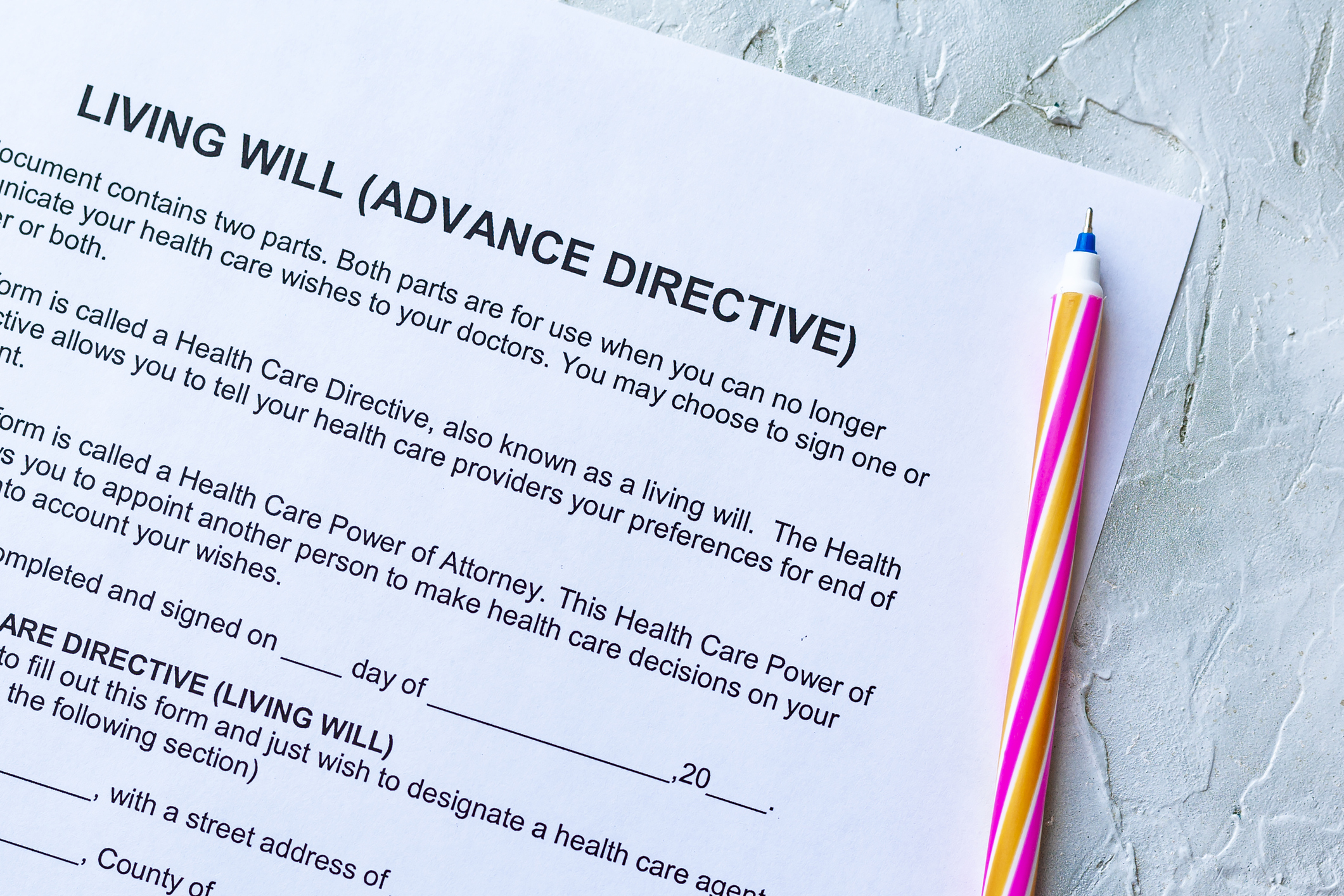The Essentials You Need for an Estate Plan
You can reduce stress and expenses for yourself and your family if you develop an estate plan that includes these important documents.


Profit and prosper with the best of Kiplinger's advice on investing, taxes, retirement, personal finance and much more. Delivered daily. Enter your email in the box and click Sign Me Up.
You are now subscribed
Your newsletter sign-up was successful
Want to add more newsletters?

Delivered daily
Kiplinger Today
Profit and prosper with the best of Kiplinger's advice on investing, taxes, retirement, personal finance and much more delivered daily. Smart money moves start here.

Sent five days a week
Kiplinger A Step Ahead
Get practical help to make better financial decisions in your everyday life, from spending to savings on top deals.

Delivered daily
Kiplinger Closing Bell
Get today's biggest financial and investing headlines delivered to your inbox every day the U.S. stock market is open.

Sent twice a week
Kiplinger Adviser Intel
Financial pros across the country share best practices and fresh tactics to preserve and grow your wealth.

Delivered weekly
Kiplinger Tax Tips
Trim your federal and state tax bills with practical tax-planning and tax-cutting strategies.

Sent twice a week
Kiplinger Retirement Tips
Your twice-a-week guide to planning and enjoying a financially secure and richly rewarding retirement

Sent bimonthly.
Kiplinger Adviser Angle
Insights for advisers, wealth managers and other financial professionals.

Sent twice a week
Kiplinger Investing Weekly
Your twice-a-week roundup of promising stocks, funds, companies and industries you should consider, ones you should avoid, and why.

Sent weekly for six weeks
Kiplinger Invest for Retirement
Your step-by-step six-part series on how to invest for retirement, from devising a successful strategy to exactly which investments to choose.
If you’ve been putting off your estate plan, you aren’t alone. Only 47.9% of Americans age 55 or older reported having any estate-planning documents in a 2020 survey by Caring.com.
No one wants to think about getting seriously ill or dying, but these things happen. That’s when having the right documents makes a big difference. “This isn’t the kind of planning you want to be doing in the hospital or the nursing home,” says Patrick Simasko, elder law attorney and wealth preservation specialist at Simasko Law in Mount Clemens, Mich.
Not having estate-planning documents can rack up the estate’s cost—including taxes—and delay the transfer of assets to heirs. A stressful situation is made even worse for loved ones, and the courts may step in to make decisions on the deceased person’s behalf. So make the most of the tools in your estate-planning toolbox.
Here’s a primer on what those tools are and how to use them, including a new one you may not have considered.

Write a Will and Update Account Beneficiaries
Simasko believes that a standard estate-planning toolbox should include a will, up-to-date beneficiary designations, a living will and a financial power of attorney, also known as a POA.
A will is what people usually think of first for estate planning. It gives instructions for what you’d like to happen if you pass away, such as who would receive your property, who would be in charge of distributing your estate and who would take care of your minor children and pets. If you pass away without a will, known as dying intestate, the probate courts make these decisions for you based on state law.
Simasko considers a will to be the least urgent of the estate-planning documents, especially for retirees. “If someone dies intestate, the state courts essentially give them a will to distribute the property. Most clients plan on leaving their money to their children, which is how the courts would distribute everything anyway.”
This isn’t to say you should skip writing a will. It’s still helpful to get your wishes down on paper, especially if you have special instructions, such as leaving some property to charity. The key point is don’t assume you’ve finished with estate planning just because you have a will.
One reason a will is not enough is that many accounts follow beneficiary designations. For your life insurance policies, qualified retirement accounts and annuities, you name a beneficiary to inherit the money after you pass away. Make sure these instructions are up to date. “The will only applies if you don’t have any beneficiaries listed on these accounts,” says Adam Goetz, a partner at Burstin & Goetz in Pittsburgh and the national president of the MassMutual Advisors Association.
Otherwise, the beneficiary instructions take precedence, even if you ask for something different in your will. “We saw one case where a client forgot he left his 93-year-old mother as the beneficiary for his retirement account, not his spouse,” Goetz adds. “When he died, his mother inherited the money, and now we’ve got to gift the funds back to the spouse while minimizing taxes. It’s awful.”
Goetz recommends performing an annual review of all these accounts to make sure the beneficiary instructions are correct, and that you aren’t leaving money to the wrong person.
Your bank and taxable brokerage accounts could also offer a similar system, called a transfer-on-death agreement. “Setting up a transfer-on-death agreement shows your planned distribution and helps avoid delays in transferring the assets,” says Goetz. “It’s amazing how few brokers and banks talk about this feature.”

Make Sure You Have a Living Will
Another key part of estate planning is figuring out what should happen if you are alive but unable to make decisions for yourself. “A will explains who you want to make decisions for your property after you’ve died, but it doesn’t give your family the right to make medical decisions when you’re still alive,” says Simasko. “For that, you’ll need a living will, also known as an advance directive or medical POA.”
A living will names a conservator to make medical decisions on your behalf. The conservator can decide things like whether you will go through with a surgery or take a medication. Your living will should serve as a guide for the conservator by listing medical instructions for yourself. For example, these instructions may include whether you want to be kept on life support if you are terminally ill or don’t want blood transfusions for religious reasons. “When my father had a stroke, he didn’t have anything. My mother had to go to court just for the right to make his medical decisions,” says Simasko. By creating this document, you can be in charge of your future health decisions, not a judge.
Although the living will gives someone the power to handle your medical decisions, it doesn’t give them the right to handle your money. For that, you need a financial power of attorney. With this document, you name a guardian to manage your finances, such as paying your bills and overseeing your investments.
If you don’t have a financial POA, once again the courts pick a guardian for you and that can get messy. “Best case scenario, it just wastes time,” says Simasko. “But what if there’s a disagreement between the kids which leads to a costly legal battle? What if the courts name someone inappropriate?” For instance, in a Michigan case, the courts picked a home health service for this role, rather than the couple’s daughter, a decision that ended up draining the estate because the agency charged a fortune in fees.

Decide If You Need a Trust
There are a few other documents you might need for your estate plan. You could require a revocable trust if you’re leaving property to minor children or to someone who can’t handle the money on their own, such as a family member with special needs.
The trust inherits the property and a trustee that you name will manage everything on their behalf indefinitely or until they reach an age you think is appropriate. “You legally can’t leave property to a minor, and you really don’t want to leave a lot of money to an 18-year-old,” says Simasko. A trust could manage everything until they’re a little older, say, age 25, while giving them income until then.
Life insurance can also be an effective way to leave an inheritance. “There’s no better way to transfer money forward,” says Goetz. “Your loved ones receive the death benefit income-tax-free without delays from probate.” On the other hand, if you leave them a retirement plan like a traditional 401(k), the balance is taxable when withdrawn. That’s why, for inheritance planning, it could be more effective to make periodic withdrawals from your retirement plan to pay for a life insurance policy.
A digital POA is a new addition to the estate-planning toolbox. This document names someone to shut down your Facebook, LinkedIn, email and other digital accounts. “It’s emotionally difficult to see someone who passed away six months ago still ‘living’ in a digital space,” says Goetz. “You need to give someone legal authority to shut them down for you or it’s challenging otherwise. It’s not like Facebook runs a call center to assist.”
Whichever tools you decide to use, the key is to get moving on your estate plan as soon as possible. It’s even easier now with many lawyers using Zoom for appointments, says Simasko. Although you could create the documents yourself using a website such as LegalZoom, he recommends consulting an attorney to at least make sure you’ve completed everything properly.
You should discuss your estate plans with the rest of your family and avoid unpleasant surprises, such as someone expecting a larger inheritance or being upset that they weren’t named for a certain role.
This is also a good time to explain where family members can find all your documents and accounts so nothing gets lost. The insurance company Mass Mutual has a checklist of what to do and discuss with your family.
Estate planning can feel a little awkward and even morbid, but it’s one of the most important gifts you can offer to your heirs and yourself. Your loved ones will thank you for it.
Profit and prosper with the best of Kiplinger's advice on investing, taxes, retirement, personal finance and much more. Delivered daily. Enter your email in the box and click Sign Me Up.

David is a financial freelance writer based out of Delaware. He specializes in making investing, insurance and retirement planning understandable. He has been published in Kiplinger, Forbes and U.S. News, and also writes for clients like American Express, LendingTree and Prudential. He is currently Treasurer for the Financial Writers Society.
Before becoming a writer, David was an insurance salesman and registered representative for New York Life. During that time, he passed both the Series 6 and CFP exams. David graduated from McGill University with degrees in Economics and Finance where he was also captain of the varsity tennis team.
-
 Here’s How to Stream the Super Bowl for Less
Here’s How to Stream the Super Bowl for LessWe'll show you the least expensive ways to stream football's biggest event.
-
 The Cost of Leaving Your Money in a Low-Rate Account
The Cost of Leaving Your Money in a Low-Rate AccountWhy parking your cash in low-yield accounts could be costing you, and smarter alternatives that preserve liquidity while boosting returns.
-
 I want to sell our beach house to retire now, but my wife wants to keep it.
I want to sell our beach house to retire now, but my wife wants to keep it.I want to sell the $610K vacation home and retire now, but my wife envisions a beach retirement in 8 years. We asked financial advisers to weigh in.
-
 10 Retirement Tax Plan Moves to Make Before December 31
10 Retirement Tax Plan Moves to Make Before December 31Retirement Taxes Proactively reviewing your health coverage, RMDs and IRAs can lower retirement taxes in 2025 and 2026. Here’s how.
-
 The Rubber Duck Rule of Retirement Tax Planning
The Rubber Duck Rule of Retirement Tax PlanningRetirement Taxes How can you identify gaps and hidden assumptions in your tax plan for retirement? The solution may be stranger than you think.
-
 What Does Medicare Not Cover? Eight Things You Should Know
What Does Medicare Not Cover? Eight Things You Should KnowMedicare Part A and Part B leave gaps in your healthcare coverage. But Medicare Advantage has problems, too.
-
 QCD Limit, Rules and How to Lower Your 2026 Taxable Income
QCD Limit, Rules and How to Lower Your 2026 Taxable IncomeTax Breaks A QCD can reduce your tax bill in retirement while meeting charitable giving goals. Here’s how.
-
 457 Plan Contribution Limits for 2026
457 Plan Contribution Limits for 2026Retirement plans There are higher 457 plan contribution limits in 2026. That's good news for state and local government employees.
-
 Estate Planning Checklist: 13 Smart Moves
Estate Planning Checklist: 13 Smart Movesretirement Follow this estate planning checklist for you (and your heirs) to hold on to more of your hard-earned money.
-
 Medicare Basics: 12 Things You Need to Know
Medicare Basics: 12 Things You Need to KnowMedicare There's Medicare Part A, Part B, Part D, Medigap plans, Medicare Advantage plans and so on. We sort out the confusion about signing up for Medicare — and much more.
-
 The Seven Worst Assets to Leave Your Kids or Grandkids
The Seven Worst Assets to Leave Your Kids or Grandkidsinheritance Leaving these assets to your loved ones may be more trouble than it’s worth. Here's how to avoid adding to their grief after you're gone.
